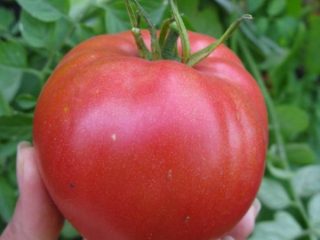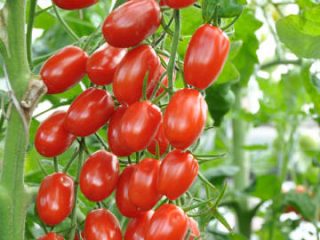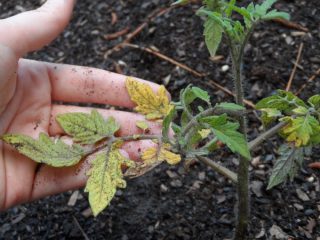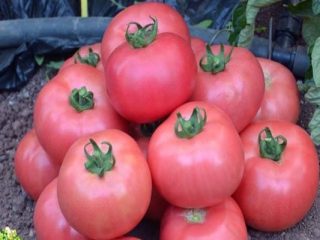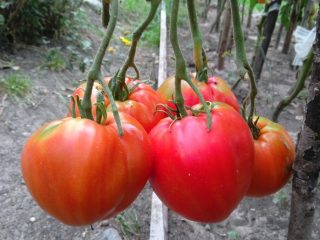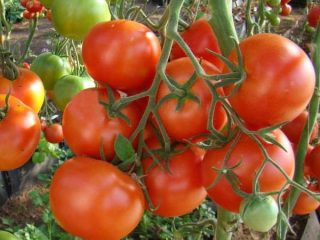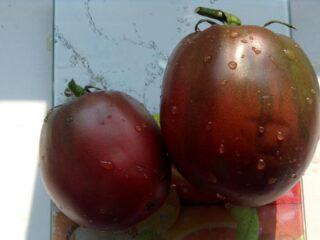Content
- 1 History of origin
- 2 Description of the tomato variety Legend of Koktebel
- 3 Characteristics of the Legend of Koktebel tomato
- 4 Advantages and disadvantages of the Legend of Koktebel tomato
- 5 Features of cultivation
- 6 Pest and disease control
- 7 Conclusion
- 8 Reviews from gardeners about the Legend of Koktebel tomato
The Legend of Koktebel tomato is a large-fruited type of crop that appeared recently, but has already gained wide popularity among gardeners. This was facilitated by the variety’s low maintenance requirements, high yield and excellent taste of tomatoes, which are capable of growing to a huge size. However, in order for the effectiveness to correspond to that declared by the manufacturer, certain rules of agricultural technology must be followed.
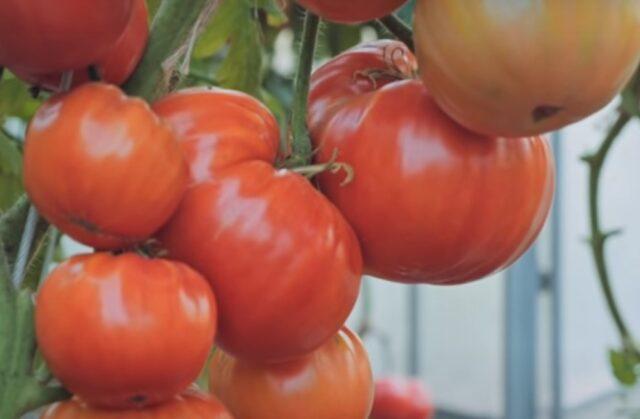
Tomatoes of the Legend of Koktebel variety are resistant to cracking
History of origin
Legend of Koktebel is a new variety that went on sale in 2020. It was obtained thanks to the efforts of breeders of the Partner agricultural company. Suitable for growing in open ground and greenhouses.
So far, the Legend of Koktebel tomato has not been included in the State Register, since variety trials on it have not yet been completed. However, judging by the reviews of gardeners, this species has proven itself well in the southern and central regions.
Description of the tomato variety Legend of Koktebel
Legend of Koktebel is a natural variety, which makes it possible to use the collected seeds from grown tomatoes for sowing. The resulting seedlings fully retain their species properties.
This species belongs to the category of indeterminate, that is, the growth of the main shoot is unlimited. This ensures continued fruiting until autumn frosts. The height of plants in open ground reaches 1.7-1.8 m, and in greenhouses - more than 2 m. The plant needs to be tied to a support. The shoots of the Legend of Koktebel tomato are thickened, strong, can withstand the load of fruit, and do not break. The variety forms a large number of stepsons throughout the growing season, which must be removed in a timely manner. This allows you to redirect the plant’s forces to the formation of tomatoes.
The leaves of the Legend of Koktebel are of standard shape and size, dark green. The flowers are bright yellow, collected in simple and complex inflorescences. The first fruit cluster of the Legend of Koktebel is laid above 8-9 leaves, and then after 2-3. Each of them can produce 5-6 tomatoes.
This species is considered mid-early. The first fruits on the plant ripen 110-115 days after emergence. According to the description of the variety, reviews, photos, Legend of Koktebel tomatoes are characterized by their large size on average 350-600 g, but when the ovary forms, 2-3 pieces each. The weight of the fruit in the cluster is 1-1.5 kg.
When ripe, the fruits acquire a uniform red tint. They have a pleasant sweet taste with a moderate tomato aroma. The fruits are multi-chambered, the pulp is juicy, fleshy, moderately dense. Tomato seeds are small. When you cut a Legend of Koktebel tomato, the juice does not flow.The skin is dense, thin, and when eaten it is not felt.
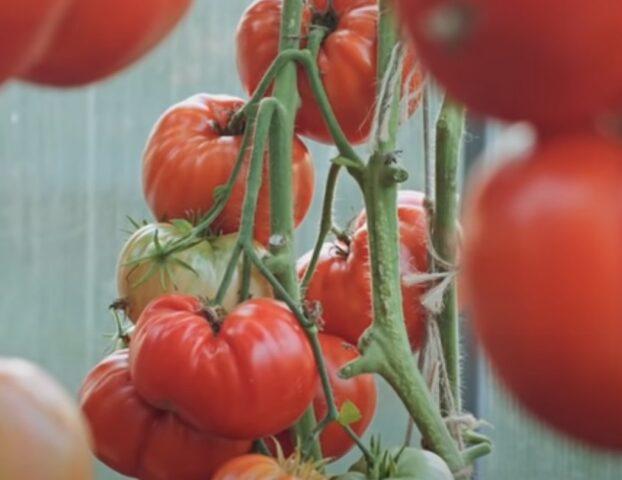
There is no green spot near the stalk on the Legend of Koktebel tomatoes
Characteristics of the Legend of Koktebel tomato
To be able to compare this variety with other types of crops, it is necessary to study its characteristics. This will also allow you to get a complete picture of the Legend of Koktebel tomato.
Tomato productivity Legend of Koktebel
If you follow all the rules of agricultural technology, you can harvest about 8 kg from one bush. Moreover, Legend of Koktebel’s yield of marketable tomatoes is 80-90%.
Resistance to diseases and pests
This variety is characterized by high natural immunity. And therefore it is little susceptible to common cultural diseases. But to maintain its stability, it is recommended to spray plants with fungicides to prevent fungal diseases.
Among the pests, damage to a tomato can be caused by the whitefly in a greenhouse and the Colorado potato beetle at the initial stage of development in open ground.
Where is it used?
Thanks to their balanced taste, Legend of Koktebel tomatoes are ideal for fresh consumption. They also go well with greens in summer salads. These tomatoes are also suitable for processing. You can use them to prepare lecho, pasta, sauce, juice.
Advantages and disadvantages of the Legend of Koktebel tomato
This variety, like other types of crops, has strengths and weaknesses. And when growing it, you should familiarize yourself with them in advance.
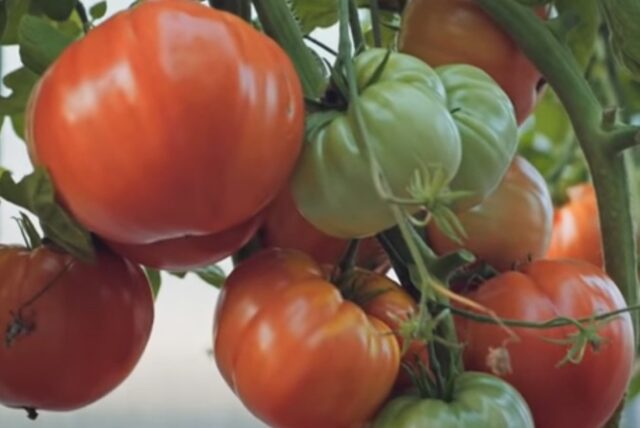
Ripe tomatoes stay on the branches for a long time and do not fall off
Main advantages:
- early maturation;
- long fruiting;
- balanced taste;
- large size tomatoes;
- increased resistance to diseases;
- seeds can be used for sowing;
- tomatoes do not crack;
- high productivity;
- easily tolerates short-term lack of moisture;
- suitable for transportation.
Flaws:
- requires stepsoning;
- needs to be tied to a support;
- not suitable for whole-fruit canning;
- susceptible to nutritional deficiencies.
Features of cultivation
It is recommended to grow the Legend of Koktebel variety using seedlings. Sowing should be carried out so that by the time the plants are planted in a permanent place, they are 60-65 days old. Therefore, the optimal period is considered to be the beginning or middle of March.
Seeds should be planted in wide, shallow containers. Using a substrate consisting of turf, sand, peat and humus in a ratio of 2:1:1:1. Planting material should be buried 0.5 cm into the moistened soil. The seeds of this tomato germinate in 5-7 days at a temperature of +23-25 °C. In the future, you should adhere to standard care rules, and when two true leaves grow, you need to pick the seedlings into separate containers.
Legend of Koktebel seedlings should be transplanted into a greenhouse at the end of April, and into open ground when the soil warms up sufficiently to a depth of 15 cm, which usually happens at the end of May, at the beginning of June. When planting, plants should be buried down to the first pair of leaves to stimulate the growth of a strong root system.
It is recommended to water Legend of Koktebel tomatoes when the top layer of soil dries to a depth of 3-5 cm. Irrigation is carried out at the root to prevent moisture from getting on the leaves.To do this, use settled water at a temperature of +18+20 °C.
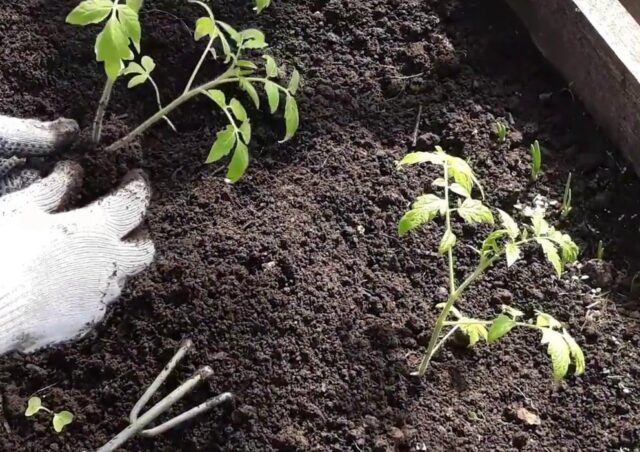
The optimal planting scheme is 2-3 plants per 1 square meter. m
This variety needs good nutrition throughout the growing season. Ten days after planting, tomatoes should be fed with urea or ammonium nitrate at the rate of 30 g per 10 liters of water. Two weeks after this, organic matter should be used: mullein 1:10 or chicken manure 1:15. Before flowering and thereafter every 14 days, phosphorus-potassium mineral mixtures should be used.
You should also use wood ash extract for fertilizing. You need to pour 200 g of the component into 1 liter of hot water and leave for 24 hours. And after time, bring the volume of liquid to 10 liters, and pour the resulting solution over the tomatoes at the root at the rate of 1 liter per bush.
As the shoots grow, they need to be tied to a support. Also, tomatoes should be hilled 2-3 times per season to strengthen the root system.
Pest and disease control
To maintain high immunity, Legend of Koktebel tomatoes should be sprayed with fungicides 3-4 times. For this, it is recommended to use drugs such as Hom, Ridomil Gold, Quadris, Revus.
To protect Legend of Koktebel tomatoes from whiteflies, you should regularly ventilate the greenhouse, since this insect becomes active at high humidity and temperature. In case of damage to plants by this pest, it is recommended to spray the leaves with Fitoverm and water the bushes with Aktara solution. It is necessary to repeat the treatment every 5-7 days until the signs of whitefly disappear.
To protect Legend of Koktebel tomatoes from the Colorado potato beetle in open ground, when planting, you need to water them with Aktara solution at the rate of 0.25 liters per plant.
Conclusion
Tomato Legend of Koktebel is a new promising variety, which, according to many gardeners, is one of the best salad varieties. But in order for the tomatoes to really impress with their size, you need to strictly observe the planting dates and adhere to the basic rules of care. You should also regularly feed the bushes, then you can harvest the crop before the autumn frosts.
